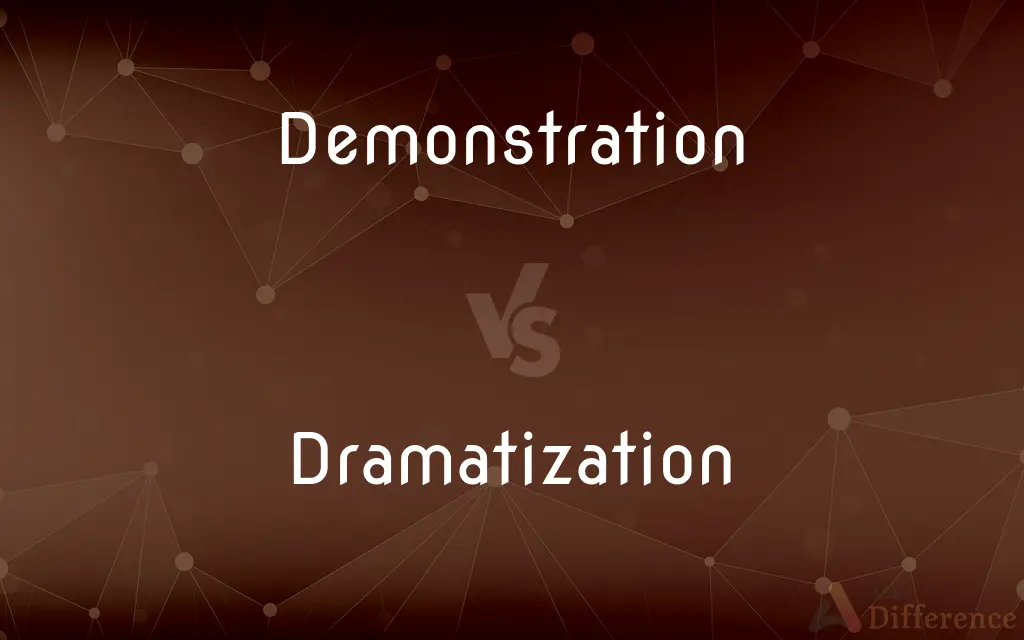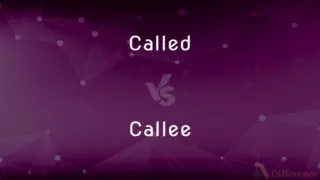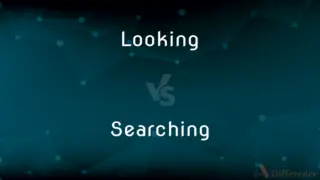Demonstration vs. Dramatization — What's the Difference?
Edited by Tayyaba Rehman — By Maham Liaqat — Updated on March 13, 2024
Demonstration involves showing how something works or proving a point, often in a public or educational setting, while dramatization involves adapting real or fictional events into a dramatic presentation.

Difference Between Demonstration and Dramatization
Table of Contents
ADVERTISEMENT
Key Differences
Demonstration is a method used to explain or teach by showing how something works or is performed, typically in a clear and straightforward manner to ensure understanding. On the other hand, dramatization takes stories, events, or concepts and converts them into a narrative form, emphasizing emotional and thematic elements to engage the audience.
Demonstrations are often factual and objective, aiming to provide evidence or illustrate a principle through practical examples. Whereas, dramatizations infuse creativity and artistic interpretation, focusing more on storytelling and character development than on factual accuracy.
While demonstrations are commonly used in educational contexts, such as classrooms or workshops, to facilitate learning and comprehension, dramatizations are primarily associated with entertainment, found in theater, film, and television, where the goal is to evoke feelings or convey messages in a compelling way.
Demonstrations rely on direct, clear communication and tangible examples to achieve their purpose, making them accessible and informative. Dramatizations, however, employ various artistic devices like dialogue, music, and visuals, offering a more immersive and emotive experience.
Despite their differences, both demonstrations and dramatizations can be powerful tools for communication. Demonstrations can effectively convey information and skills, while dramatizations can leave a lasting impact by connecting with audiences on an emotional level.
ADVERTISEMENT
Comparison Chart
Purpose
To instruct or show how something works
To entertain or tell a story through drama
Focus
Factual accuracy, clarity
Emotional impact, narrative
Common Settings
Educational environments, public displays
Theater, film, television
Communication Style
Direct and clear
Artistic, involving dialogue and visuals
Audience Engagement
Through understanding and learning
Through emotional and aesthetic experience
Compare with Definitions
Demonstration
Showing how a machine operates.
The chef's demonstration of the new blender made me want to buy it.
Dramatization
Adapting a book into a play.
The dramatization of the novel brought the characters to life.
Demonstration
A technique or action shown for educational purposes.
The science teacher's demonstration involved a chemical reaction.
Dramatization
Converting stories for theatrical performance.
Their dramatization of local folklore entertained the community.
Demonstration
A public display of opinion.
The peaceful demonstration downtown drew thousands of supporters.
Dramatization
Making a situation seem more dramatic.
The documentary's dramatization of the crisis captured audiences' attention.
Demonstration
A practical explanation or teaching method.
Her demonstration of the software simplified complex concepts.
Dramatization
Depicting real-life events in a movie.
The film was a dramatization of historical events.
Demonstration
Evidence or proof.
He provided a demonstration of the theorem's validity.
Dramatization
Enhancing a presentation with dramatic elements.
His speech included a dramatization of the company's founding.
Demonstration
The act or process of providing evidence for or showing the truth of something
A demonstration of the drug's efficacy.
A demonstration of the theorem.
Dramatization
A version that has been dramatized.
This is a dramatization of life 1000 years ago.
Demonstration
An event at which something will be demonstrated.
I have to give a demonstration to the class tomorrow, and I'm ill-prepared.
Dramatization
The act or art of dramatizing something
The dramatization of a novel.
Demonstration
An illustration or explanation, as of a theory or product, by exemplification or practical application
A demonstration of ballroom dancing.
Dramatization
A work adapted for dramatic presentation
A dramatization of the last days of his presidency.
Demonstration
A piece of evidence
That car he bought is supposed to be a demonstration of his commitment to clean energy.
Dramatization
The act of dramatizing.
Demonstration
An expression or manifestation, as of one's feelings
A demonstration of her displeasure.
Dramatization
Act of dramatizing; a dramatic representation.
Demonstration
A public display of group opinion, as by a rally or march
Peace demonstrations.
Dramatization
Conversion into dramatic form;
The play was a dramatization of a short story
Demonstration
The act of demonstrating; showing or explaining something.
Dramatization
A dramatic representation
Demonstration
(prison slang) A prisoner's act of beating up another prisoner. en
Demonstration
Expression of one's feelings by outward signs.
Demonstration
A public display of group opinion, such as a protest march.
Demonstration
A show of military force.
Demonstration
A proof.
Demonstration
The act of demonstrating; an exhibition; proof; especially, proof beyond the possibility of doubt; indubitable evidence, to the senses or reason.
Those intervening ideas which serve to show the agreement of any two others are called "proofs;" and where agreement or disagreement is by this means plainly and clearly perceived, it is called demonstration.
Demonstration
An expression, as of the feelings, by outward signs; a manifestation; a show. See also sense 7 for a more specific related meaning.
Did your letters pierce the queen to any demonstration of grief?
Loyal demonstrations toward the prince.
Demonstration
The exhibition and explanation of a dissection or other anatomical preparation.
Demonstration
Mil.) a decisive exhibition of force, or a movement indicating an attack.
Demonstration
The act of proving by the syllogistic process, or the proof itself.
Demonstration
A course of reasoning showing that a certain result is a necessary consequence of assumed premises; - these premises being definitions, axioms, and previously established propositions.
Demonstration
A public gathering of people to express some sentiment or feelings by explicit means, such as picketing, parading, carrying signs or shouting, usually in favor of or opposed to some action of government or of a business.
Demonstration
The act of showing how a certain device, machine or product operates, or how a procedure is performed; - usually done for the purpose of inducing prospective customers to buy a product; as, a demonstration of the simple operation of a microwave oven.
Demonstration
A show or display; the act of presenting something to sight or view;
The presentation of new data
He gave the customer a demonstration
Demonstration
A show of military force or preparedness;
He confused the enemy with feints and demonstrations
Demonstration
A public display of group feelings (usually of a political nature);
There were violent demonstrations against the war
Demonstration
Proof by a process of argument or a series of proposition proving an asserted conclusion
Demonstration
A visual presentation showing how something works;
The lecture was accompanied by dramatic demonstrations
The lecturer shot off a pistol as a demonstration of the startle response
Common Curiosities
What is a dramatization?
Dramatization is the process of adapting a story or event into a dramatic format, such as a play, film, or performance.
What is a demonstration?
A demonstration is a method of teaching or showing how something works through practical examples.
Can a demonstration be part of a dramatization?
Yes, demonstrations can be incorporated into dramatizations to show how something works within a narrative context.
Are dramatizations always fictional?
No, dramatizations can be based on real events or stories, although they may include fictionalized elements for dramatic effect.
What role does creativity play in dramatization?
Creativity is crucial in dramatization for developing the narrative, characters, and visual and auditory elements that make the story compelling.
How do demonstrations and dramatizations differ in purpose?
Demonstrations aim to instruct or clarify, while dramatizations seek to entertain or tell stories with emotional depth.
Can demonstrations be entertaining as well as educational?
Yes, demonstrations can be both entertaining and educational, especially when they reveal surprising aspects or innovative applications of a concept.
How do audiences engage with demonstrations versus dramatizations?
Audiences learn from demonstrations through direct information and examples, whereas they connect emotionally and aesthetically with dramatizations.
What elements are crucial for effective dramatization?
Effective dramatization requires a compelling narrative, developed characters, and the use of artistic elements like dialogue and visuals.
How do demonstrations and dramatizations utilize visual elements?
Demonstrations use visual elements to show processes or evidence clearly, while dramatizations use them to create an immersive and emotional narrative experience.
Can dramatizations impact how we perceive historical events?
Yes, dramatizations can shape perceptions by highlighting certain aspects or emotional truths of historical events, though they may not always be historically accurate.
What makes a good demonstration?
A good demonstration is clear, informative, and directly shows how something works or proves a point.
How do dramatizations benefit education?
Dramatizations can enhance learning by engaging students emotionally and making complex subjects accessible through storytelling.
Why are demonstrations important in science education?
Demonstrations in science education allow students to see principles in action, enhancing understanding and retention of concepts.
What skills are important for creating demonstrations?
Skills important for creating demonstrations include clarity in explanation, a thorough understanding of the subject, and the ability to engage and inform an audience.
Share Your Discovery

Previous Comparison
Called vs. Callee
Next Comparison
Looking vs. SearchingAuthor Spotlight
Written by
Maham LiaqatEdited by
Tayyaba RehmanTayyaba Rehman is a distinguished writer, currently serving as a primary contributor to askdifference.com. As a researcher in semantics and etymology, Tayyaba's passion for the complexity of languages and their distinctions has found a perfect home on the platform. Tayyaba delves into the intricacies of language, distinguishing between commonly confused words and phrases, thereby providing clarity for readers worldwide.














































